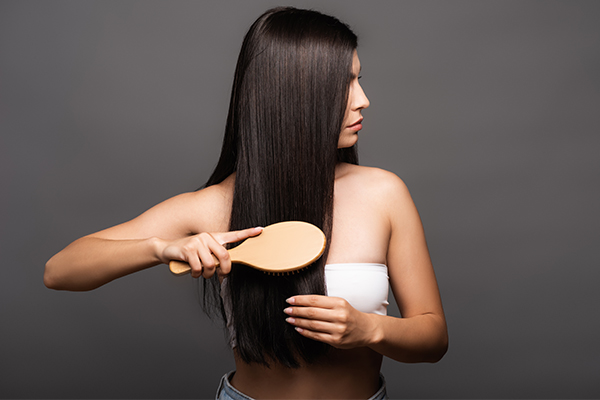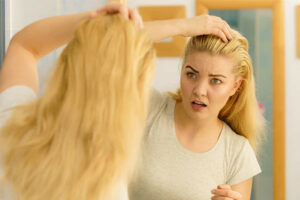Hair loss is a common problem in long hair and can be a terrifying experience for many. The hair reflects a person’s uniqueness and personality. Most people consider their hair as an asset as it can make a first impression.

Different hair lengths may have different degrees of hair fall, and it has been observed that people with some specific hair types face more hair fall than others. It is usual to shed 50–100 hairs per day.
Telogen effluvium occurs when a person has severe hair fall. (1)
People with long hair face more hair fall as there is more hair volume to lose. When a person with long hair experiences breakage and hair fall, it is easily noticed compared to those with short hair.
A substantial amount of hair fall can be observed daily when brushing, taking a shower, or doing other daily-life activities.
Article Contents
Do People With Long Hair Have More Hair Fall?
Each hair type has different characteristics and problems. For example, long hair can easily get pulled and get stuck in brushes due to its length compared to short hair. Thus, it is more prone to breakage, damage, and consequently hair fall. Also, short hair lengths have more strength and durability.
No scientific links have been found between long hair, hair loss, and balding. Balding is related to internal health causes and has no relationship to external lengths; they are all based on genetics and heredity. (1)(2)
Moreover, hair fall is not related to the condition of the hair shaft but to its roots, especially the hair bulb.
As the hair bulb is situated on the scalp, internal factors can drive hair fall. Some of these factors include hormonal changes, stress, diseases, lack of a nutritious diet, and genetic factors. Thus, hair fall is not due to the extra length of the hair.
Causes of Hair Loss in Women With Long Hair

Here are some contributing factors to hair loss in women with long hair:
- When hair is tightly pulled into ponytails, cornrows, dreadlocks, or extensions, the hair undergoes stress and can fall out from the follicles.
- In addition, hair washing, styling, and other things can be responsible for hair fall. Excessive heat and hazardous chemical usage in the hair when getting hair treatments can also affect the hair volume and lead to hair fall.
- Hair treatments such as blow-drying, straightening, and coloring can remove the natural oil of the hair. Moreover, some hair products can dry out the hair shaft, damaging the cells responsible for hair growth. Other such things can cause toxicity to the hair roots and follicles, ultimately leading to significant hair loss.
- Hereditary hair loss can be either male or female pattern. The visible part of the hair is dead protein, and it has no biochemical activity. Thus, hair length is not a factor in hair loss as it is not related to the biological activities under the skin. Men facing male-pattern baldness experiencing hair loss is generally due to genetic factors and it has no relation with the length of the hair. (2)
- Excessive brushing of the hair can lead to hair loss. Thus, avoid brushing your hair too much.
- Health issues such as thyroid problems, anemia, and anorexia, among others, can manifest excessive hair fall as a symptom. Treatment of these conditions can help control hair loss.
- Some drugs including oral contraceptives, steroids for muscle building, blood thinners, antidepressant pills, and medications for heart diseases and arthritis can cause excessive hair fall. (1)
- Though vitamin A can help improve hair growth, too much of it can do the opposite and lead to hair fall. Vitamin A is present in liver or fish oils, dairy products, carrots, broccoli, and fortified cereals. Avoid taking vitamin A supplements to prevent overdose and the consequent hair fall when you are getting enough vitamin A in your diet. (3)
Tips to Control Hair Fall in Long Hair
You must pay attention to your long hair to keep it healthy and strong. Here are some things you can do:
- Maintaining a healthy lifestyle.
- Practice good hair hygiene.
- Avoid hair dyes and hairsprays.
- Practice regular oiling of the hair.
- Follow a nutritious diet.
- Don’t tie your hair tightly.
- Have regular consultations with a trichologist or a dermatologist. (1)(2)
General Queries Related to Hair Fall in Long Hair

Do teens with long hair lose more hair?
No. Growing your hair long during your teen years will not lead to hair fall. The length of hair does not affect its health, but you need to take good care of your hair to prevent damage.
Each hair strand has a different life cycle from other hair strands. Each hair sheds after completing its life cycle, and losing around a hundred hairs daily is normal.
The longer your hair, the more you notice it fall, as it is visible on your clothes and belongings. In short, your hair’s health is not related to its length. (4)
Does pulling long hair cause baldness?
Tying your long hair in ponytails and braiding it may cause hair fall, but it is not the cause of permanent hair loss, as seen in male-pattern baldness. Rough hairstyles can damage the hair, but it does not lead to baldness.
Baldness occurs due to internal factors in the body. To fight baldness, turn to scientifically proven methods rather than cutting your long hair. (5)
How much hair fall is normal?
Losing hair around 50–100 strands daily while combing or washing the hair is normal. If more than 100 strands are falling daily, it can be pathological hair loss and require immediate action. (1)
Final Word
Several reasons are behind hair loss. People with long hair can lose their hair because of damaging harsh hairstyles and treatments.
In the long run, these extreme hairstyles and treatments can damage the hair follicles, which can result in traction alopecia, a type of baldness. (5) Thus, there is no relationship between long hair and hair loss.







